Market Dominance Guys
Season 4
Episodes
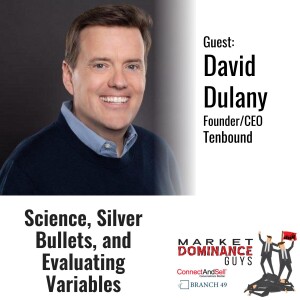
Wednesday Dec 28, 2022
EP162: Science, Silver Bullets and Evaluating Variables
Wednesday Dec 28, 2022
Wednesday Dec 28, 2022
Scientific methods have a place in sales, whether it is to keep existing customers happy or to continue building the pipeline. David Dulany of Tenbound says, “You create a hypothesis of what your messaging is going to be, and then you run an experiment on it and report on the results of the methodology that you're using, do a little bit more research, change it up, make a new hypothesis, and run the same structure over and over again basically for the rest of your life.” Unless you are willing to reevaluate what is working and what is not continuously, it will all stop working, and static growth or loss of business is inevitable. Chris, Corey, and David have solutions for you. They suggest you look at the efficiency of the people, the processes, and the current technology you currently have in place. Many of these companies have a tech stack, and they don't optimize it and look at it from the perspective of setting it up correctly to really be able to get all the juice out of it. Evaluate the value of what's on hand versus coming up with some new silver bullet that will solve everything. Listen to this episode of Market Dominance Guys, “Science, Silver Bullets and Evaluating Variables.
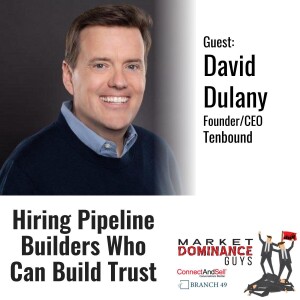
Tuesday Dec 20, 2022
EP161: Hiring Pipeline Builders Who Can Build Trust.
Tuesday Dec 20, 2022
Tuesday Dec 20, 2022
CROs, VP of Sales or VP of SDRs need to be able to persuade like Atticus Finch, write and email like Tarantino, and perform like DiCaprio. You’re actually looking for people to have a decent conversation with somebody that is built on trust and authenticity. You can’t solve that if all you want to do is hire more SDRs. David Dulany continues his conversation with Corey and Chris. He says, “The number one recommendation that I would make if people were asking is do not hire five SDRs First, hire a really good operational person that can connect the dots and set the stage and set the foundation between all the technology and the processes and the playbook to get that in place and then start to layer on the people that can actually execute on that. “ If companies have a good sales operations person that has the bandwidth to be able to help the SDRs, it makes a huge difference in helping them quickly learn how to create that trust. There’s more to this success plan than this, but you’ll have to listen to get the details on this episode of Market Dominance Guys, “Hiring Pipeline Builders Who Can Build Trust.”
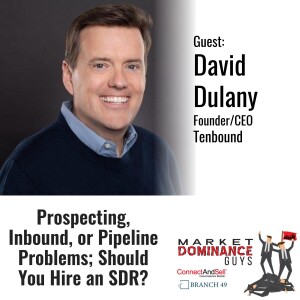
Thursday Dec 15, 2022
EP160: Prospecting, Inbound, or Pipeline Problems; Should You Hire an SDR?
Thursday Dec 15, 2022
Thursday Dec 15, 2022
How are you tracking your pipeline’s success? If you are only looking at one quarter or two, you are missing the larger picture of the attribution. Most of the results are going to be 3, 4, 5, and 6 quarters later. Is it the SDRs, advertising, phone calls made, or conversations you’ve had? If you wait too long to look at where the pipeline is coming from and where it is weak, you may be behind by an additional three to six months at that point. Companies are cutting back on prospecting teams without fully appreciating the long-term effect on the pipeline. David Dulany, Founder and CEO at TenBound, joins Chris and Corey for the first in a three-part series on Market Dominance Guys. In this episode, you’ll hear why a vendor is like someone with one leg of a giraffe and the other of an octopus tentacle. How do you walk with those? Or is it like Wile E Coyote running into the tunnel the Roadrunner painted on the side of the road? Chris sums up this episode, “Failure to prospect today will turn future good times into bad times that are worse than today.” How will you avoid this position? Listen to “Prospecting, Inbound, or Pipeline Problems; Should You Hire an SDR?” to find out.
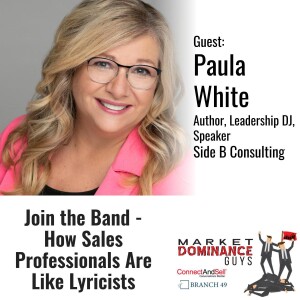
Wednesday Dec 07, 2022
EP159: Join the Band - How Sales Professionals Are Like Lyricists
Wednesday Dec 07, 2022
Wednesday Dec 07, 2022
A company’s leadership – the lead singer, picks up the pieces and fills in the holes in a performance. Their drummers keep the rhythm of the deal moving forward so everyone can stay in time. But what about the sale professional making the calls – the lyricist? The correct tone of a single syllable can make or break a conversation before it starts. Corey and Chris continue their conversation with Paula S. White of Side B Consulting. They compare the ways different cultures start a cold call. We have more in common with all of our varying cultures than you may think when we start the call admitting we are an interruption and that we have never met the prospect on the other end. Paula takes us through the skill of being an unexpected listener and where that is valuable in every business encounter. The good news is it can be learned, like a memorable piece of music or a favorite song that takes us back to a favorite memory. Join these sales musicians in this episode, “Join the Band – How Sales Professionals Are like Lyricists.”
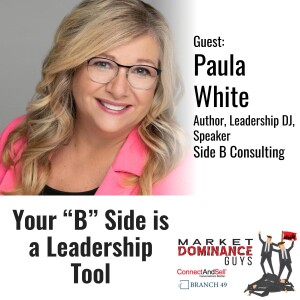
Wednesday Nov 30, 2022
EP158: Your “Side B” Is a Leadership Tool
Wednesday Nov 30, 2022
Wednesday Nov 30, 2022
What helps make someone an effective leader? According to our guest, Paula White, the Leadership DJ of Side B Consulting, it’s all about employing a leader’s human side along with their business side when they connect with their team. Using music and musician metaphors, Paula helps leaders discover the aspects of their flip side — Side B — which define their humanity, and how they can combine their Side B aspects with their business side to become intentionally connected with their team members. Our hosts, Corey Frank and Chris Beall, bring their own experiences as team leaders to this topic, discussing with Paula how an imbalance of power can often impede an honest exchange between a leader and his team members, and how the application of a leader’s Side B traits can diminish this. Curious to discover your own Side B? Get some insights from today’s Market Dominance Guys’ episode, “Your ‘Side B’ Is a Leadership Tool.”
About Our GuestPaula S. White is the Leadership DJ of Side B Consulting in New Albany, Ohio. Side B Consulting helps leaders combine their business-minded skills with their relationship-based people skills to more effectively lead their teams.
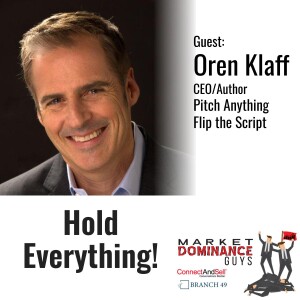
Tuesday Nov 22, 2022
EP157: Hold Everything!
Tuesday Nov 22, 2022
Tuesday Nov 22, 2022
When you’re nearing the end of the quarter, especially the fourth quarter, do you tend to panic and offer a discount in order to close any deals hanging fire? Oren Klaff, New York Times bestselling author of Pitch Anything and Flip The Script, discusses the downside of this neediness on today’s Market Dominance Guys podcast. Our two hosts, Chris Beall and Corey Frank, explore with Oren what happens to the status you have so carefully built with your prospective customer if you blatantly display just how needy and desperate you are to close the deal. Does showing your soft underbelly increase your chance of closing the deal? Or does your neediness kill the deal altogether? Oren’s advice is to stick to the sales process — and HOLD, no matter what. Join these three sales analysts as they caution the sales reps of the world about the pitfalls of a needy mindset when a sales deadline is looming on today’s Market Dominance Guys’ episode, “Hold Everything!”
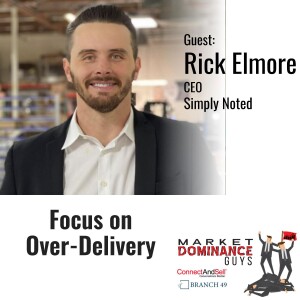
Wednesday Nov 16, 2022
EP156: Focus on Over-Delivery
Wednesday Nov 16, 2022
Wednesday Nov 16, 2022
“It costs five times more to get a new client than to keep one you already have.” Today, Rick Elmore, Founder and CEO of Simply Noted, elaborates on his commitment to customer retention and to his company’s practice of over-delivery with our Market Dominance Guys’ host, Chris Beall. Rick believes that building relationships with clients is vital to any company’s success, so he begins by onboarding each new customer himself, answering all the frequently asked questions, and personally checking back to make sure the customer’s initial experience with Simply Noted’s products and services is a happy one. “When you’re truly on your client’s side, they’ll hear it in your voice,” Rick explains. Listen to this podcast, and you too will hear the commitment to customer retention in Rick’s voice in today’s Market Dominance Guys’ episode, “Focus on Over-Delivery.”
About Our Guest
Rick Elmore is founder and CEO of Simply Noted in Tempe, Arizona, a company that utilizes software and robotic technology to create personalized handwritten notes for its 300,000 monthly users.
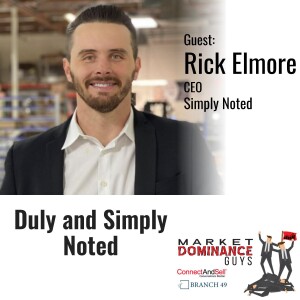
Tuesday Nov 08, 2022
EP155: Duly and Simply Noted
Tuesday Nov 08, 2022
Tuesday Nov 08, 2022
Who would have guessed that hand writing a note to 500 prospects would be a highly successful marketing campaign? Our guest, Rick Elmore, did! Founder and CEO of Simply Noted, Rick joins our host, Chris Beall, today to discuss his career path from college, to professional NFL football player, to a job in medical device sales and marketing, to a startup company now in its fourth year. It was the success of his handwritten-notes campaign that encouraged Rick to found his own business, offering this same service — now automated — to help individuals and companies utilize the personal touch of what looks like a handwritten note to reach out to their customers. Rick and Chris talk about the open rate of these notes versus the open rate of cold — or even warm — emails. You’ll want to hear it with your own ears on this Market Dominance Guys’ episode, “Duly and Simply Noted.”
About Our Guest
Rick Elmore is the founder and CEO of Simply Noted in Tempe, Arizona. Simply Noted is a company that utilizes software and robotic technology to create personalized handwritten notes for its 300,000 monthly users.
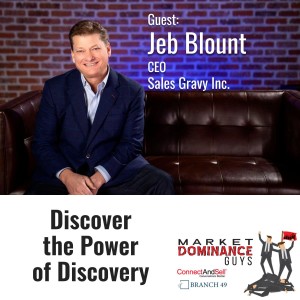
Wednesday Nov 02, 2022
EP154: Discover the Power of Discovery
Wednesday Nov 02, 2022
Wednesday Nov 02, 2022
Most sales reps think discovery isn’t sexy: Closing the deal is. But “Deals are won or lost in discovery,” cautions Sales Gravy CEO Jeb Blount, today’s podcast guest. This successful author of 15 sales-related books advises that “80% of your time in the sales process should be in discovery,” especially during a recession, when the discovery call becomes even more important. In this second of two interviews with Jeb, our Market Dominance Guys’ hosts, Corey Frank and Chris Beall, share sales-success nuggets taken from Jeb’s most recent book, Selling in a Crisis: 55 Ways to Stay Motivated and Increase Sales in Volatile Times. You’ll want to listen closely as these three like-minded sales gurus explain their own discovery-call practices for establishing trust and how they get prospects to open up to them. All of this and so much more in today’s Market Dominance Guys’ episode, “Discover the Power of Discovery.”
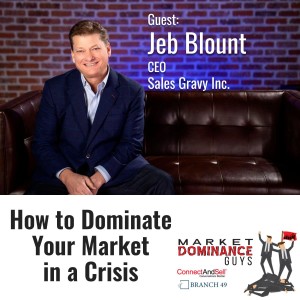
Tuesday Oct 25, 2022
EP153: How to Dominate Your Market in a Crisis with Jeb Blount
Tuesday Oct 25, 2022
Tuesday Oct 25, 2022
What changes should you make when you’re selling in an economic-downturn period? Today’s podcast guest, Jeb Blount, is CEO of Sales Gravy and a successful author and podcaster. With 15 books to his name, including his latest, Selling in a Crisis: 55 Ways to Stay Motivated and Increase Sales in Volatile Times, it’s obvious that Jeb knows what he’s talking about when discussing sales techniques during these troubled times. His suggestion? You’ve got to pay close attention to patterns, as well as the signals you’re getting from prospects and customers. In this first of two interviews with our Market Dominance Guys’ hosts, Corey Frank and Chris Beall, Jeb shares his advice about selling a price increase to customers, and about honing and re-honing your message as fears about the current economy’s impact are revealed in your prospects’ objections. Jeb’s also a firm believer in selling alongside his sales team and listening to his reps’ calls to provide just-in-time coaching. Get ready to take notes as this master of selling practices lets you in on what works and what doesn’t in today’s Market Dominance Guys’ episode, “How to Dominate Your Market in a Crisis.”
About Our Guest
Jeb Blount is CEO at Sales Gravy, Inc., which is a global leader in sales acceleration and customer experience enablement solutions. He is the author of 15 sales-related books, including his most recent release, Selling in a Crisis: 55 Ways to Stay Motivated and Increase Sales in Volatile Times. Jeb is also the host of the Sales Gravy Podcast, the world’s most downloaded sales podcast.
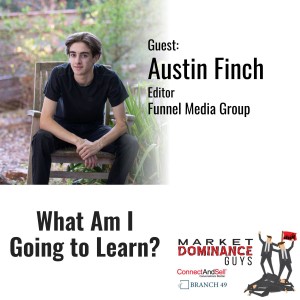
Tuesday Oct 18, 2022
EP152: What Am I Going to Learn?
Tuesday Oct 18, 2022
Tuesday Oct 18, 2022
Most people look at a potential job from the standpoint of “What am I going to earn?” Austin Finch, Funnel Media Group’s podcast editor and today’s guest on Market Dominance Guys, talks with our host, Chris Beall, about an additional and very important way of looking at any new employment you’re considering. They suggest asking yourself the question, “What am I going to learn?” Austin cautions job hunters that even a high-paying job can be a dead-end job. When you’re looking at a new job — whether it’s in sales or another field — Austin suggests that “If you can gain experience, and move on to gain more, then there’s no reason to hold yourself back.” Listen to the whole podcast for more words of career wisdom from Chris and Austin in today’s insightful and helpful Market Dominance Guys’ episode, “What Am I Going to Learn?”
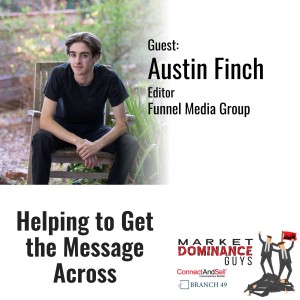
Wednesday Oct 12, 2022
EP151: Helping to Get the Message Across
Wednesday Oct 12, 2022
Wednesday Oct 12, 2022
Who’s behind the curtain making the Market Dominance Guys the great podcast that it is? It’s Austin Finch, an editor at Funnel Media Group, which produces Market Dominance Guys. In listening to this conversation between Austin and our host, Chris Beall, you would never know that Austin is the youngest guest ever interviewed for this podcast. Currently 17 years old, he has edited Market Dominance Guys for several years and has recently added Helen Fanucci’s “Love Your Team” podcast to his editing responsibilities. In talking with this intelligent, thoughtful, and insightful young man, Chris asks about the challenges of podcast editing, including the pruning and grafting necessary to increase a podcast audience’s understanding and to decrease the distractibility caused by any audio glitches or guests’ faux pas. Austin loves his job and sees his editing work as that of a translator for the hosts’ and guests’ messages, and his goal as “Helping to Get the Message Across,” which just happens to be the title of today’s Market Dominance Guys’ episode.
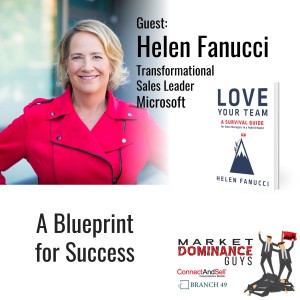
Wednesday Oct 05, 2022
EP150: A Blueprint for Success
Wednesday Oct 05, 2022
Wednesday Oct 05, 2022
Retaining your top talent and delivering results is a challenge for all sales leaders when your top talent can walk out the door without taking a single step.
The hybrid work revolution has made sales management the most pivotal role in the innovation economy—and simultaneously the most challenging. Our guest today is Helen Fanucci, Transformational Sales Leader at Microsoft, with 25 years managing hybrid teams and has an in-depth understanding of the problems facing sales managers today. Our Market Dominance Guys’ host, Chris Beall, conducts this second interview in his two-part conversation with Helen about her new book, Love Your Team: A Survival Guide for Sales Managers in a Hybrid World. In this podcast and in Helen’s book are details on not only what sales managers must be doing to thrive, but how to do them. It’s definitely a quintessential guide — with all the steps you need to know. But it’s even more than that as the title of today’s Market Dominance Guys episode states, it’s “A Blueprint for Success.”
About Our Guest
Helen Fanucci, Transformational Sales Leader at Microsoft is the author of Love Your Team: A Survival Guide for Sales Managers in a Hybrid World, available November 1, 2022.
Full episode transcript below:
(00:21):
Retaining your top talent and delivering results is a challenge for all sales leaders, when your top talent can walk out the door without taking a single step. The hybrid work revolution has made sales management the most pivotal role in today's innovation economy, and simultaneously the most challenging. Our guest today is Helen Fanucci, transformational sales leader at Microsoft, and has 25 years managing hybrid teams and an in-depth understanding of the problems facing sales managers today. Our Market Dominance Guys host, Chris Beall, conducts this second interview in his two-part conversation with Helen about her new book, Love Your Team: A Survival Guide for Sales Managers in a Hybrid World. In this podcast and in Helen's book are details on not only what sales managers must be doing to thrive, but how to do them. It's definitely a quintessential guide with all the steps you need to know, but it's even more than that. As the title of today's Market Dominance Guys episode states, it's a blueprint for success.
Chris Beall (01:25):
You have a team this big, you're going to have this much time spent on these one-on-ones, this much on these. These are the ones that have a fixed agenda. These are the ones that are event-driven, but they're probably going to flow at about this rate. Here's the blah, blah, blah. It's on and on. I mean, it's like an engineering breakdown. And folks, by the way, when you read this book, what you're going to get is love as both an emotional concept but also as an engineering concept. Love your team is something you do, not something you just feel. It's mostly something you do through these one-on-one conversations. There must have been a time in your career where you were going through the evolution of all this and you have all the pressures of regular sales managers, report this, blah, blah, blah, all this stuff, right?
Helen Fanucci (02:13):
Sure. Yeah.
Chris Beall (02:14):
Did you have to go through a transition or were you just like, "No, I'm always going to do it like this. Screw all you people"? Because I think for most people in the audience who want to do this, what they're going to do is they're going to read the book, then they're going to try to apply, say, some of the conversations of connection. I believe they'll probably start there because they're early and they'll notice that they didn't do one to introduce themselves to the team. And you have a great story about somebody quitting because she went to a group and never got engaged with by the audience. But you do have to go through a process of, "Gosh, I got to figure out this time management thing because that's the real constraint." Or is it just like, "I'm Helen Fanucci. I made my way through MIT. I must be able to manage my time"?
Helen Fanucci (02:58):
I had to think about time constraint, for sure. So, I used to do hour-long one-on-ones with my team. This was years ago. And somehow I thought that that's what was needed and maybe at the time that's what was needed. But I do a half-hour, actually 25 minutes now, and this is a new thing since COVID in the last 18 months is going from a half-hour conversation to 25 minutes. Because everybody's back to back and everybody needs at least a five minute break between a 30 minute or 25 minute conversation. So, I do that. Now, the other thing is I'm available on IM. So, one of the things that I talk about actually in the book in the first getting to know your team is how to communicate with me. People IM me or they'll text me, and so I'm also available for drive-by connection points in between our biweekly one-on-one.
(04:01):
So, I do biweekly one-on-ones with direct reports. And so my last team was 12 direct reports. I now have two managers that work for me and then about 30 people in my organization currently. And so I will do quarterly connections or things like that and sometimes more frequently with some of my skip level reports, people who report to the managers that report to me. And then of course, and separate from the one-on-ones, are the formal pipeline reviews. It depends on what is going on. So, it will happen twice a month if there's a hot deal happening and there's a lot of different moving parts or actions needed. It will for sure happen at least once a month. So, there are different requirements for forecasting in different organizations. So, I definitely pay attention to that and do the forecast reviews with my team so that I can be prepared when I need to report out and up to my management.
(05:10):
And one of the things I really emphasize, speaking of forecasting, is delivering three to 5% of the forecast. I don't value diving catches and last-minute deals in a way that maybe traditional sales managers might. Like, "Rah-rah, that is fantastic." Well, what that meant is it's a missed opportunity for us to get additional investments in our business if we didn't forecast that revenue. Because our investments in our business are directly tied to the anticipated and forecasted revenue. So, if we're under-forecasting all the time, we are missing out on a whole bunch of opportunity to actually increase our value to our customers and get more headcount and investments for our team.
Chris Beall (05:58):
I remember reading that in the book and going, "Oh yeah, that's right." As the guy who's on the other side making those investments, if the forecast is sandbagged, it's off, it's short, it's light just to look good, then it's like, "Well, how much are we going to put as a company into achieving that number?" If you take the thought experiment, you tell me you're going to make nothing, what am I going to invest in you? Well, nothing. I got to find somebody else to do the job. I want to switch up a little bit to you experiencing... You didn't just write a book, you actually do it. I've watched you do it now for, I guess, three years. And I've always been kind of surprised.
(06:38):
It's like sales management to me, when I've seen a lot of it, is, "Yeah, I put somebody in a territory, try to get a good rep, put them in a territory, hope they work out, tell them war stories about how great you were back in the day. Fire them if it doesn't work out and they go to club if it does." It's kind of like that's sales management. You have this very systematic step-by-step process or repeatable cycles within the process with these 17 conversations. My guess is that of the 17 conversations, one kind of conversation is the favorite, the one you look forward to it. If it's the first on the calendar in the morning, you get up a little bit earlier and are hyped up for it and ready to go, and you don't want any distractions and away you go.
(07:25):
And then there's always one kind of thing that you know you got to do, but it's not your fave. It's just it's there and you got to make sure you do it and do it well. But it's not the one that you... And I know you. You're going to do both of them. But what is your favorite? The one that really gets you jazzed. You've looked back on it, maybe you want to talk about it over dinner and wine in the evening. And then what's the, you got to do it, it's really important, but I don't love it that much?
Helen Fanucci (07:54):
Okay. So, I'll start with the second first. I don't love performance improvement, performance management conversations. What's so critical to any role, but particularly when your employees are remote, is you set clear performance-based expectations, outcome-based expectations, not activity expectations. And so what that means is obviously there's quota achievement required, but also for my team it is building stronger, deeper relationships with customers. So, I do a whole list of, if you will, hard expectations, hard numbers that are quantifiable, 3x pipelines, things like that, and then soft, like building a stronger relationship with your customer and increasing the executive engagement with a customer and things like that. So, when my team members, if they're falling short of performance expectations, I address that head on, I talk to them, and then they're on a performance improvement plan of some sort. I don't love that at all. So, that's my least favorite.
(09:15):
So, now that we have that out of the way, let me go to my most favorite, and that is account strategy and ideation and sales strategy. And I love talking with my team about that, brainstorming the next action. So, they'll bring to me a situation, it could be a customer situation, maybe a customer executive left and they're trying to figure out how to get in to see somebody else or the replacement, and so we talk about, "Okay, who knows who and how do we navigate and do we need to bring in one of our executives as bait in the bucket to get this executive to come and meet with us?" So, I love account strategy ideation. That's my favorite part. And a lot of it is asking questions to really understand what's going on and what is needed so that I can be helpful.
(10:16):
Because sometimes what's presented to me, it sounds like we need to have a discount or an investment, but as you get into it it could be that there could be a miscommunication with the customer. It could be that there are things that we need to do to make sure we really understand their business sufficiently that we can present the best solution for them. And maybe it gets redirected to a different offering or a different tactic, if you will, to keep the business moving forward, deal at hand moving forward. So, I love the strategy part of it the most.
Chris Beall (11:01):
Sounds like fun for me too. I really think that that part of business is always fun. When you're ideating, you're brainstorming, you're trying to figure it out. And also it's got to be fun when those action plans are put together and they're progressing to have those one-on-ones that determine, "So, how's it going? And are we achieving what we... We took a guess. We did a thing. Now what?" That's got to be fun too.
Helen Fanucci (12:06):
Yeah, it is, for sure. Yep. You bet.
Chris Beall (12:12):
Yeah. So, Love Your Team is directed at an audience of sales managers. It says so right in the subtitle. A Survival Guide for Sales Managers. Now, I suspect that your way of looking at the world and the techniques and that structure of having these important conversations probably is applicable to all management. But you're not going to go crazy and just say that's it. So, let's think of your audience as sales managers for a moment. As you think about that audience and you think back on writing the book, were there any of those conversations you thought, "This ain't the 100 level course, this ain't the 200 level course. This is where your skills are really going to be challenged"? There's a lot on the line. You have a whole section on skills, on conversational skills, which I've never seen before in a book like this, that says, "These are the skills you need to hold these conversations."
(13:03):
So, there's the skills. We're all lacking in different skills and we all have strong in different skills. And then there's the conversations. And we've never talked about this before. I'm just curious. Did you ever get to the point of thinking, "Oh man, this is like 400-level course stuff that somebody is going to try it, but it's going to be hard for them to do it because the skills required are going to be in short supply"? Or did that not ever come up? Maybe it's like, "Yeah, yeah, everybody can do this."
Helen Fanucci (13:35):
Well, it never came up because what I intended to do with this book is reflect on what I think is needed for sales managers to be successful. And I will say, this is B2B enterprise sales. And so that's my world, and so it won't be applicable to everybody. And I'm not trying to convert people who don't want to be converted, but if folks think that they have a challenge retaining talent or they want some new ideas, I'm hopeful that the book is helpful for them. To be honest with you, I probably am not the best observer of myself. So, while these conversations may seem obvious to me and straightforward and I broke them down and intended to make them accessible and straightforward, I really don't know what the audience of sales managers reading the book, I really don't know where the struggle might be. And I'd be super curious to know that and how I could be more helpful. But I'm kind of blind there, to be honest with you. I don't know.
Chris Beall (14:49):
Yeah. It was probably smart to be blind there because it would be easy to overcook some of these sections if you think that they're too difficult or whatever. I found in my reading of the book, and for the audience, just so you know, in its various forms I've probably now read it nine times, maybe 10 times, not always deeply, but this is a confession. Normally I don't read any book twice. I'm a very fast reader. I love to read. I don't read twice. I get something out of Love Your Team every time I read it. And that's on top of a very, very long career. So, I think that there's a lot of depth and subtlety in your description of these conversations.
(15:32):
As I think them through, I think this way of looking at the world and then putting it into action of having these conversations as a means of getting action, a means of getting results, some of which are, I'll call it action results like deals, revenue, et cetera, but some of which are really, we'll call them valuation results, that as companies are worth more now when they have great talent on board. You lose talent and you lose value. You lose your future as a company. You lose the option value of being able to do things with great people that you can't really do with either not great people or while you're trying to find people.
(16:12):
So, I've read it a bunch of times, but I kept coming back to, "Gosh, I wonder whether people are going to be able to do this or not." And I've come to the conclusion they will be able to do it. I think you've broken it down to the point... Give an example out of, say, the first of the conversations of connection. What is an example of a level of detail that you've provided that somebody might think, "Why is she telling me to do this? Of course, I'm going to do that," but in fact you probably suspect without the detail they aren't going to do that or we aren't going to do that?
Helen Fanucci (16:46):
Introducing yourself to your team. I have three PowerPoint slides that I show. I talk about, the first slide is about me, what's my career background, my family situation. And in fact, I did this introduction to new team members this summer, and I put our wedding picture on it because that was current and timely and that was on that slide. And then a little bit about me. And also, what are my favorite things? Like what's my favorite thing to eat or drink? And so my favorite thing to eat is anything somebody else cooks. So, I'm lucky that Chris likes to cook, and every meal that he cooks is my favorite meal. And then what I like to drink and things like that. So, just fun facts or things I like to do, hobbies or skiing or things like that. So, that's the first slide.
(17:44):
The second slide is my leadership approach and philosophy. I list out the things that are on that slide, like culture first and people first, results-oriented, clarity of results and expectations, no surprises, if there's bad news, communicate it early, things like that. And then the last slide is what's next? So, I make it clear that I'm going to set up one-on-ones with each of them and they don't need to come prepared. It's really just to get to know them. And I also talk about how to communicate with me. So, as I mentioned, IM and texting works great. And so that's what I put on the three slides. So, it's really short and sweet. And for my last team of 12 people, I had each of them introduce theirselves briefly and tell me a fun fact of themselves, like where they like to travel or something like that.
(18:49):
My current team of 30, I did not have everyone introduce themselves but I followed up in over a two or three week period. I met with each of them, all 30 of them, even those that report to my managers. I met each of them for 30 minutes, had a one-on-one with each of them. So, that's the level of specificity and detail in why I do it. And it may or may not work for the reader to be that specific, or maybe they haven't reflected on what their leadership approach or style is and what they care about. So, it's an opportunity for them to reflect on that. So, getting back to your last question as you were then talking, I thought about what might be tough for the reader. And I think what might be tough is the orientation to think about their team first, if that's not how they've been doing their role to date.
(19:50):
So, for example, I think about servant leadership. How can I amplify my team's success? And so when my team members are presenting to the deal review board to try to get a discount or investment or resources for their customer, I ask them, "Would it be useful if I take notes in the background so you can stay present in the conversation and your presentation?" And they all take me up on it. So, I will be off camera. I will take notes and including actions, and then I send it to them after the meeting and the call. And I think it might be tempting for sales leaders to be the ones that are doing the presentation in front of the top ranking executive in the company and the finance team and having that visibility.
(20:49):
Many sales leaders want that for themselves. I want to amplify my team and I want to help my team learn and grow. So, I'm in the background. And that might seem weird to some of the folks who are listening to this podcast or reading the book. And so it might not be everyone's cup of tea, but I'm authentically telling them how I do it for their consideration.
Chris Beall (21:17):
I love that thing where you take notes, and it's not so you can keep tabs on them or whatever. It's so the person who's reporting to you or reporting to the person reporting to you can focus on what they're doing and their internal presentation, say as the example you gave, and do a great job and be exposed. I really like the fact that... This one, I think everybody should think about. If you really love your team, you're going to help them get positive exposure for what they're doing, not just in the number, but in every day or as life is going on to the senior executives. And it might result in somebody wanting to pluck them out of your team and put them somewhere else. And that's okay. If that's what they want to do, if that's good for them, that's your job to help them and support them in that. I think that is the hardest reorientation for folks probably is, even if it means that that exposure or that help, that support, whatever you're giving them is going to let them go get another job, so to speak, that's still your job.
Helen Fanucci (22:23):
Yeah, for sure. I do have explicit career conversations with team members and my recommendations. That happens at least twice a year. Sometimes if there's a lot going on we'll talk more frequently. But my team that I just referenced, a team of 12 sellers, three of them now have management roles within Microsoft. So, the three of them I was involved in coaching. They shadowed me in some cases. And so I absolutely think it's a win and it's a success. If your team's not learning and growing, they're going to leave. And actually the data supports that as well. It's fundamental to what folks care about is that they learn and grow. And so I support that. And yes, it means I have to backfill them and hopefully they stay at my current company, which is Microsoft. And if for whatever reason they decide that Microsoft isn't serving their career anymore, well okay, that's okay too. But it's really success on their terms, not my terms that I aim to support.
Chris Beall (23:43):
I think that's such a big, big message and a big change between the Love Your Team approach and the standard approach. If we were just to boil it down to the one thing, it's their north star becomes your north star. And it's individual. It's one-on-one. And I think that's a radical big idea that to some people might sound soft or it might sound dangerous, like, "Oh my God." But your view is it's actually the safe route in a sense, right? It may sound different, but you're reliant on them anyway. You're already in the boat with them.
Helen Fanucci (24:17):
Here's the thing is, I need to model the behavior I want to see in them. So, I expect my team to work well across the organization with their peers and building trust and building relationships is foundational for me with my team, but it's also foundational for them with their customers. And so understanding what constitutes success for customers on their terms is critical for us to be able to deliver value and make sure that whatever we're selling actually meets their needs so they get to say so. So, it kind of goes downhill, so to speak, or it's a virtuous cycle where we all win if the customers are successful in getting what they want in return. And so it's, I'm modeling the behavior I expect to see in my sellers as well.
Chris Beall (25:16):
Well, on that note, I guess we've finally come full circle all the way around to what the other 140-something episodes are about, which is having trust-based conversations with customers, which in the Love Your Team system actually happens more easily and more naturally because what's happening on the inside is then happening on the outside. Helen, you and I have run out of time for this podcast. Thank God we haven't run out of time for each other. And on that, I'm going to say, Corey, we miss you. We love you. But Helen and I had a really good time making this one today.
(25:52):
I am so pleased that you could be on today, Helen. Your book again, Love Your Team: A Survival Guide for Sales Managers in a Hybrid World. It's out November 1st. This podcast will drop a little sooner than that. Everybody who's watching this, listening to it, doing whatever you're doing with it, mark it in your calendar November 1st, and if you're really smart, reach out to Helen and see God knows what, LinkedIn or whatever. She might actually do something special for you in the book department. I really don't know, but it's going to be an incredible experience for you. Thank you so much, Helen.
Helen Fanucci (26:28):
Thank you, Chris.
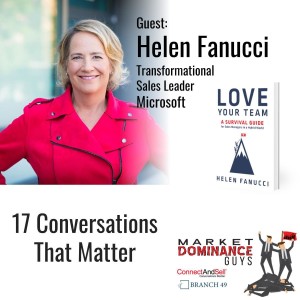
Wednesday Sep 28, 2022
EP149: 17 Conversations That Matter
Wednesday Sep 28, 2022
Wednesday Sep 28, 2022
In this scary new world of employment, where top sales talent has the power to stay with your team or leave you in the lurch, how do you hold onto that top talent? Helen Fanucci, Transformational Sales Leader at Microsoft and our guest on Market Dominance Guys, knows the answer to this question — and that answer has 17 parts. Helen has taken her 25 years of experience managing remote teams and turned that knowledge into a ground-breaking book titled, Love Your Team: A Survival Guide for Sales Managers in a Hybrid World (available on Amazon Nov. 1, 2022). In it, Helen details the 17 conversations that sales leaders must master with their team to successfully attract and retain top talent. Our podcast host, Chris Beall, questions Helen about her tried-and-true theories on why putting your sales team members first will get you the results you’re expecting. Get ready to take notes about this brave new approach to managing sales teams in today’s Market Dominance Guys’ episode, “17 Conversations That Matter.”
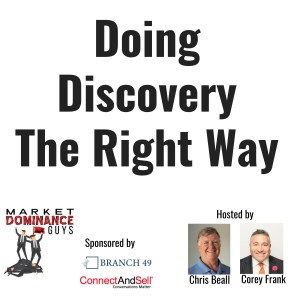
Tuesday Sep 13, 2022
EP147: Doing Discovery the Right Way
Tuesday Sep 13, 2022
Tuesday Sep 13, 2022
What are the best practices for conducting a successful discovery conversation? And how do those practices differ from having a successful cold call? On today’s Market Dominance Guys’ podcast, our hosts, Corey Frank and Chris Beall, share their insights into these two distinctly different types of sales conversations. They talk about tone, about call length, and about the practiced performance of a cold call, which has the goal of setting an appointment, versus the slower-paced, getting-to-know-you interchange of information, which has the goal of answering the question, “Does it make sense — to both parties — to proceed further?” Stay tuned to hear the advice and cautions of these two sales experts on today’s Market Dominance Guys’ episode, “Doing Discovery the Right Way.”
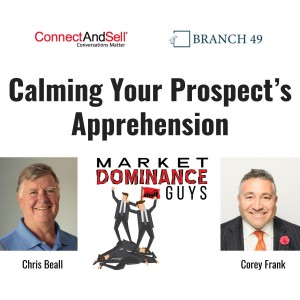
Wednesday Sep 07, 2022
EP146: Calming Your Prospect’s Apprehension
Wednesday Sep 07, 2022
Wednesday Sep 07, 2022
"Every discovery call begins with apprehension,” says Chris Beall, our Market Dominance Guys’ co-host, who is back behind the microphone after a two-month absence. Chris goes on to say that you need to be aware that starting a discovery call by interrogating your prospect only increases their apprehension. If you’re going to have a meaningful, successful conversation, you need to use a kinder, gentler approach. Chris talks with his co-host, Corey Frank, about a couple of ways he knows to take a prospect from that feeling of apprehension and fear to a feeling of pride and openness. Then, and only then, will the atmosphere of the call be right for you to ease the conversation into one of mutual discovery, where you and your prospect can learn whether their company is a fit for your product. As the title of today’s Market Dominance Guys’ podcast states, this can only happen once you’ve succeeded in “Calming Your Prospect’s Apprehension."
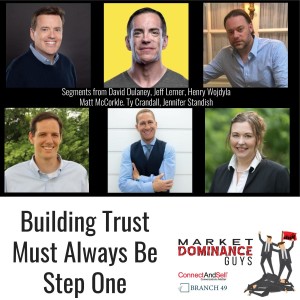
Wednesday Aug 24, 2022
EP145: Building Trust Must Always Be Step One
Wednesday Aug 24, 2022
Wednesday Aug 24, 2022
In this episode of the Market Dominance Guys, Corey and Chris agree on the importance of building trust before anything else can happen. They are joined by Transformational Coach Jennifer Standish, Henry Wojdyla, Founder and Principal at RealSource Group, Matt McCorkle, Manager of Branch Operations at Kaiser Compressors, and hosts Ty Crandall on the Business Credit and Finance Show, Jeff Lerner from Ep 150 of Millionaire Secrets, and David Dulaney on the Sales Development Podcast. The full episodes to the ones included here are listed below:
EP91: Borrowing from the Best
EP109: Being There for Your Customers
EP123: Hire Yourself a Grandma
The Business Credit and Financing Show
Sales Development Podcast https://www.spreaker.com/user/9196584/episode-164-done
MILLIONAIRE SECRET #150 Unlock Your Potential with Jeff Lerner
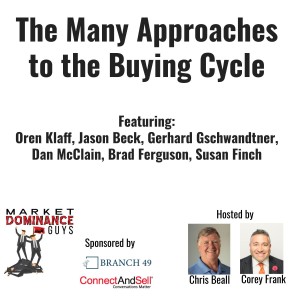
Wednesday Aug 17, 2022
EP144: The Many Approaches to the Buying Cycle
Wednesday Aug 17, 2022
Wednesday Aug 17, 2022
These sales experts agree, that there is more than one approach to a successful sales campaign. We're sure Chris Beall has some dark childhood story about alternate ways of skinning a cat, although he's never done it, of course. These discussions include modifications and redirections in the buying cycle, even though the basics are still there: awareness, consideration and decision. Join Corey and Chris in this episode of snippets from episodes about the buying cycle. This features Oren Klaff, Jason Beck, Gerhard Gschwandtner, Susan Finch, Dan McClain, Brad Ferguson, and our own Chris Beall and Corey Frank. To hear the entire episodes features, visit this collection:
https://marketdominanceguys.com/category/buying-cycle/
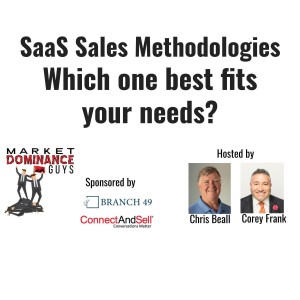
Wednesday Aug 10, 2022
EP143: SaaS Sales Methodologies - which one best fits your needs?
Wednesday Aug 10, 2022
Wednesday Aug 10, 2022
Sales methodologies are the practical, how-to “guides” that support a sales process. These actions serve as a bridge between each step of the sales cycle by keeping both the buyer's and prospect's demands in mind. In our recent episodes with Brad Ferguson, Corey and Brad discussed the Sandler method vs. Oren Klaff's Pitch method. In this quick comparison segment, Corey explains the difference between the two methods, and when one fits better than the other. What is your method to determine which sales methodology fits your company? Have you bothered to determine which to use, or are you even using one method? That's a great place to start. Corey Frank is an expert at taking companies through this process - he's done it dozens of times. Welcome to this episode of Market Dominance Guys, "SaaS Sales Methodologies - which one best fits your needs?"
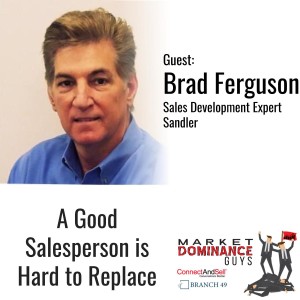
Tuesday Aug 02, 2022
EP142: A Good Salesperson Is Hard to Replace
Tuesday Aug 02, 2022
Tuesday Aug 02, 2022
Getting fired from a sales job is never a surprise. If you’re not producing, you already know it. Brad Ferguson, the managing member of Scottsdale Sales Training, has been with Sandler Training for more than 27 years, and today he shares his sales hiring, onboarding, training, and coaching expertise with our podcast host, Corey Frank. Brad believes that before you let someone go from a sales job, you need to determine whether this person can sell, and you need to consider your company’s financial investment in that individual. This includes training, coaching, and certifying, as well as their salary and benefits. Brad cautions our listeners, “Don’t let the good people you have go. Spend the time getting them up to a higher level.” If they are worth keeping, make the effort to diagnose their problems and then provide the needed training, because, as the title of this Market Dominance Guys’ episode reminds us, “A Good Salesperson Is Hard to Replace.”
About Our GuestBrad Ferguson is the CEO of Best Sales Force, Inc., an Arizona-based sales development firm. He is the Senior Sandler Training Franchisee with over 25 years of experience in the Sandler Network.
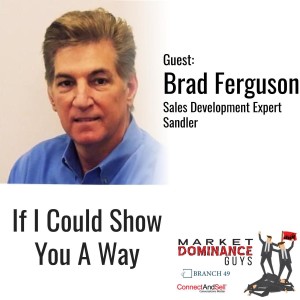
Wednesday Jul 27, 2022
EP141: If I Could Show You a Way
Wednesday Jul 27, 2022
Wednesday Jul 27, 2022
In this continued “honeymoon” edition of the Market Dominance Guys, our host, Corey Frank, sits down with Brad Ferguson of Sandler Training, one of the most highly rated sales trainers on the planet. Brad, being a top franchisee of Sandler for years, personally learned his incredible questioning techniques and prospect approaches from the founder of Sandler himself, David Sandler, more than 30 years ago.
On several of the Market Dominance Guys' podcasts over the years, Chris Beall and Corey have discussed many of the modern and fresh sales methodologies being used by successful sales professionals all over the world. From Oren Klaff’s “Pitch Anything” to Andy Paul’s “Sell Without Selling Out” to Chris Voss’ “Never Split The Difference,” there are many different flavors of sales methodologies that can be used to generate trust that result in more consistent sales success.
If you’re a pilot, you file a solid flight plan and know where you are going before you start the engines. You may change course due to bumpy weather, but you still know your final destination. If you are an architect, you know what type of building you are constructing. You have a blueprint. But if you are in sales today and you are still “winging it” and letting your personality alone dictate how your sales conversations progress, you fall into the trap of being labeled a “mere tourist” and continuing to wander inconsistently in this profession. As Uncle Zig once said, “Selling is the highest-paid hard work and the lowest-paid easy work there is.” Using a sales methodology makes the hard work easier.
In this episode, have your pen and pad ready as Brad shares several tactical and specific use cases where the Sandler methodology can be employed on your calls today. He discusses many traditional “mental hang-ups” and speed bumps that impede success from an emotional point of view. From being uncomfortable about money to having a high need for approval and an aversion to the word “no,” Brad shares just some of the powerful Sandler techniques that have generated hundreds of millions of dollars in closed deals. This is the Market Dominance Guys' nearly indispensable podcast, and today’s episode is entitled, “If I Could Show You a Way.”
About Our GuestBrad Ferguson is the CEO of Best Sales Force, Inc., an Arizona-based sales development firm. Heis the Senior Sandler Training Franchisee with over 25 years of experience in the SandlerNetwork.
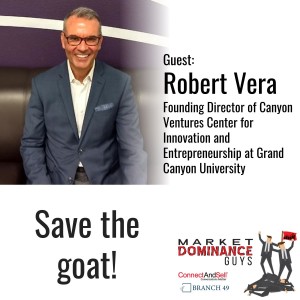
Wednesday Jul 13, 2022
EP140: Save the Goat!
Wednesday Jul 13, 2022
Wednesday Jul 13, 2022
In this special “Honeymoon” edition episode of the Market Dominance Guys, Corey grabs some time with Robert Vera, the founding Director of the Canyon Ventures Center for Innovation & Entrepreneurship at Grand Canyon University. Robert is an incredibly well-respected innovation and start-up business expert as well as a member of the faculty of the top-rated Jerry Colangelo School of Business at Grand Canyon University. Robert breaks down his involvement in training and working with the Navy Seals over the years and how sales organizations should look to adopt some of the more “unorthodox” training processes similar to what special forces and their medics implement. Robert also chats about his first-hand experiences with the unique revenue generation practice and talent development mission of the Branch49 team and how businesses should view Top of Funnel and Discovery.
This is the Market Dominance Guys' nearly indispensable podcast and today’s episode is entitled, “Save the Goat!”
About Our Guest
Robert Vera is a bestselling author and the founding director of Canyon Ventures Center for Innovation and Entrepreneurship at Grand Canyon University in Phoenix, Arizona.
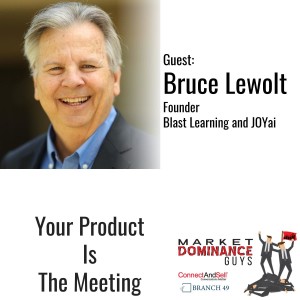
Tuesday Jul 05, 2022
EP139: Your Product Is the Meeting
Tuesday Jul 05, 2022
Tuesday Jul 05, 2022
How many cold-call opportunities have you wasted by pushing hard and fast to sell your company’s product? Today’s podcast guest, Bruce Lewolt, Founder of both JoyAI and Blast Learning, talks about a more caring and effective approach to selling. It starts with switching the goal of that initial call from selling your company’s product to offering prospects a helping hand with a problem or goal they have. Imagine for a moment you’re the prospect, and you’ve just been ambushed by a cold call: Who would you be willing to set an appointment with for a discovery meeting? A person blatantly trying to make a sale? Or a caring professional who understands your business’ needs and wants? In this episode, our three well-reasoned and insightful sales professionals share many insights with our listeners about making a successful cold call, but the one you don’t want to miss is this “aha!” moment. Your job is not selling your company’s product: Your job is selling a discovery meeting. That should make the title of this week’s Market Dominance Guys’ podcast very clear: You’re still selling something, but “Your Product Is the Meeting.”
Listen to Bruce Lewolt's previous episodes in this series:
EP137: What Do Your Prospects Really Hear?
Ep138: Don’t Get Lost in Your Rock ’n’ Roll
More episodes on the topic of Believing in the Meeting are here.
About Our Guest
Bruce Lewolt is Founder of Blast Learning, a service that uses Alexa or Google Assistant as an intelligent personal study assistant, resulting in a state-of-the-art study method that is not just effective but makes learning enjoyable. (See BlastLearning.com and BlastStudy.com) He is also the Founder of JOYai, the first emotionally intelligent and sales-savvy artificial intelligence system for salespeople, bringing intelligent automation to prospecting and selling.
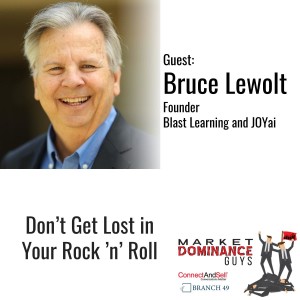
Tuesday Jun 28, 2022
EP138: Don’t Get Lost in Your Rock ’n’ Roll
Tuesday Jun 28, 2022
Tuesday Jun 28, 2022
Training and coaching are essential for the rookie cold caller, and that’s an important part of the life work of today’s guest, Bruce Lewolt, Founder of both JoyAI and Blast Learning. But, as our hosts, Chris Beall and Corey Frank, remind our podcast listeners, even the most experienced and successful cold callers also need coaching from time to time. They can suffer from an inadvertent tendency to drift away from the prescribed plan — the script, tonality, and emotion that they’ve been trained to use — one that generally elicits a prospect’s response of “Sure! Tell me why you’re calling.” Bruce agrees and says that sales directors need to listen to calls and give feedback and coaching to all salespeople on a consistent basis, because it’s human nature to drift away from what you’re taught to say and start doing what feels easier or more comfortable, or putting your own cool, personal stamp on it because that’s the way you roll. It’s not your call to make, so note the caution in today’s Market Dominance Guys’ title and “Don’t Get Lost in Your Rock ‘n’ Roll” and drift away.
About Our Guest
Bruce Lewolt is Founder of Blast Learning, a service that uses Alexa or Google Assistant as an intelligent personal study assistant, resulting in a state-of-the-art study method that is not just effective but makes learning enjoyable. (See BlastLearning.com and BlastStudy.com) He is also the Founder of JOYai, the first emotionally intelligent and sales-savvy artificial intelligence system for salespeople, bringing intelligent automation to prospecting and selling.
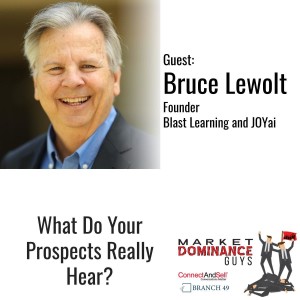
Tuesday Jun 21, 2022
EP137: What Do Your Prospects Really Hear?
Tuesday Jun 21, 2022
Tuesday Jun 21, 2022
How do you produce the emotional reaction that you want in those you are cold calling? Bruce Lewolt, Founder of both JoyAI and Blast Learning, has devoted himself to discovering the answer to this question. Bruce joins our Market Dominance Guys, Corey Frank and Chris Beall, to explain how even the most carefully worded message and well-meaning tone and pacing don’t always have the emotional significance to your prospect that you had hoped they would. “When your prospect is only half-listening, what do they hear?” Bruce asks. Ah, that’s the question! These three experienced and dynamic cold callers each share their well-thought-out theories on how to communicate authenticity, spark curiosity, and offer intrinsic value that will elicit the kind of response from your prospect that will lead to setting a meeting. Here at Market Dominance Guys, we are devoted to helping you answer the tough sales questions, like this one: “What Do Your Prospects Really Hear?”
About Our Guest
Bruce Lewolt is Founder of Blast Learning, a service that uses Alexa or Google Assistant as an intelligent personal study assistant, resulting in a state-of-the-art study method that is not just effective but makes learning enjoyable. (See BlastLearning.com and BlastStudy.com) He is also the Founder of JOYai, the first emotionally intelligent and sales-savvy artificial intelligence system for salespeople, bringing intelligent automation to prospecting and selling.
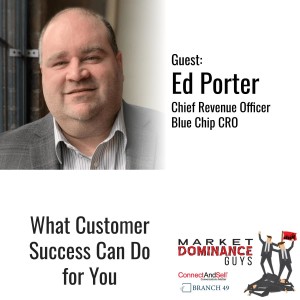
Tuesday Jun 14, 2022
EP136: What Customer Success Can Do for You
Tuesday Jun 14, 2022
Tuesday Jun 14, 2022
What’s the reason customers bought from you and will buy from you again? Don’t know? Look to the end of your buyer’s journey — to the team that helps customers successfully use their purchase. That’s the advice of Ed Porter, fractional Chief Revenue Officer of Blue Chip CRO and today’s Market Dominance Guys’ guest. In this third of three conversations with our podcast’s hosts, Corey Frank and Chris Beall, Ed suggests that you find out what’s working for customers, then take that information back to marketing to finetune the value description of your product so that it matches what customers are reporting. That’s the way to successfully sell your product: Start with the end in mind and work backward to inform marketing strategies and sales messaging. If you didn’t think that customer success had anything to do with selling, it’s time to reconsider, as today’s Market Dominance Guys’ episode’s title says, “What Customer Success Can Do for You.”
Listen to the previous two episodes with Ed Porter.
About Our Guest
Ed Porter is a fractional Chief Revenue Officer for Blue Chip CRO, providing coaching and strategy planning services for executives and startups, and helping them rethink and refocus revenue strategies to accelerate growth. He assists his clients in aligning their revenue teams — marketing, sales, enablement, and customer success — to build accountability at every step of their organization, leading to accelerated and sustainable growth. Ed is also an investor and advisor to startups in the Columbus area.
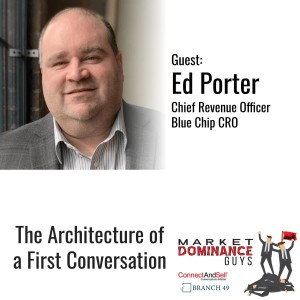
Tuesday Jun 07, 2022
EP135: The Architecture of a First Conversation
Tuesday Jun 07, 2022
Tuesday Jun 07, 2022
Whether you’re new to sales or a seasoned cold caller, you no doubt have a go-to way of starting a phone conversation with a prospect. Excellent! But how’s that working for you? Ed Porter, the fractional Chief Revenue Officer of Blue Chip CRO is our Market Dominance Guys' guest. He talks today about scripts, pattern-interrupts, and the art of conversation with our hosts, Chris Beall and Corey Frank. As Chris points out, that first conversation is an ambush call, and nobody likes to be ambushed, especially by an invisible stranger. Ed totally agrees and adds that “Fear prevents us from picking up the phone” — which is true whether you’re the salesperson or the prospect. So, what can generally get both the caller and the prospect past that fear? A well-constructed cold-calling script, but not necessarily one that a salesperson makes up on their own. Ed says it’s got to be architected from a sound plan that includes expertise and advice from both the marketing and customer success teams, which is why we’ve titled today’s Market Dominance Guys’ episode, “The Architecture of a First Conversation.”
Listen to his previous episode: EP134 - Is sales the real problem?
About Our Guest
Ed Porter is a fractional Chief Revenue Officer for Blue Chip CRO, providing coaching and strategy planning services for executives and startups, and helping them rethink and refocus revenue strategies to accelerate growth. He assists his clients in aligning their revenue teams — marketing, sales, enablement, and customer success — to build accountability at every step of their organization, leading to accelerated and sustainable growth. Ed is also an investor and advisor to startups in the Columbus area.
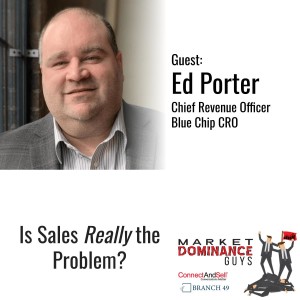
Tuesday May 31, 2022
EP134: Is Sales the Real Problem?
Tuesday May 31, 2022
Tuesday May 31, 2022
If a company isn’t experiencing success, the finger of blame is usually pointed at the sales department. Ed Porter, the fractional Chief Revenue Officer of Blue Chip CRO, is here to say that it ain’t necessarily so. Ed joins our Market Dominance Guys, Chris Beall and Corey Frank, on today’s podcast to talk about his experience in helping companies ferret out the real culprits — and it’s not always the sales reps. In exploring the problem with his own customers, Ed has discovered that marketing and customer success are often the departments that need some repair or fine-tuning. He wholeheartedly agrees with one of Chris’ maxims: In a cold call, “technology amplifies ‘suck’,” which is what you’ll see if there’s a technology-provided increase in your cold-calling speed but there’s no company alignment of messaging, training, coaching, and follow-up. So, take Ed’s advice for business trouble-shooting and ask yourself the question posed by today’s Market Dominance Guys’ title, “Is Sales the Real Problem?”
About Our Guest
Ed Porter is a fractional Chief Revenue Officer for Blue Chip CRO, providing coaching and strategy planning services for executives and startups, and helping them rethink and refocus revenue strategies to accelerate growth. He assists his clients in aligning their revenue teams — marketing, sales, enablement, and customer success — to build accountability at every step of their organization, leading to accelerated and sustainable growth. Ed is also an investor and advisor to startups in the Columbus area.
Connect with Ed Porter on LinkedIn
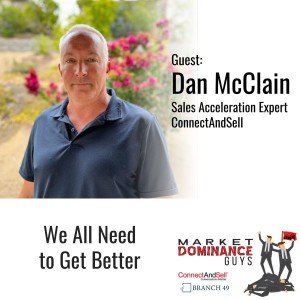
Tuesday May 24, 2022
EP133: We All Need to Get Better
Tuesday May 24, 2022
Tuesday May 24, 2022
How often do salespeople need to be trained? Most people would say, “Once during onboarding should do it.” “Not so,” says Dan McClain, Sales Director at ConnectAndSell. As today’s guest on Market Dominance Guys, Dan talks with our host, Chris Beall, about the importance of periodically sharpening sales reps’ skills. In this second of their two-part conversation, these two sales guys, both amateur chefs, agree that knives work better when they’ve recently been sharpened — and sales reps work better when their selling skills have recently been sharpened. Dan reminds our podcast audience that, over time, all sales reps drift from their company’s established message, their pace may become rushed, or their tone lackluster. For these very reasons, ConnectAndSell’s own reps go through a periodic blitz-and-coach cold-calling session, an essential tool of ConnectAndSell’s Flight School, because, as Dan says, “We all need to get better.” And because this essential advice bears repeating, that’s what we’ve named today’s Market Dominance Guys’ episode: “We All Need to Get Better.”
About Our GuestDan McClain is Sales Director at ConnectAndSell. His life-long dedication to sales has led him to his current goal: helping sales leaders, teams, and individuals connect with their targets at a velocity of 10X by using ConnectAndSell Lightning. Dan is based in the San Diego area and is active in his local chapter of AA-ISP.
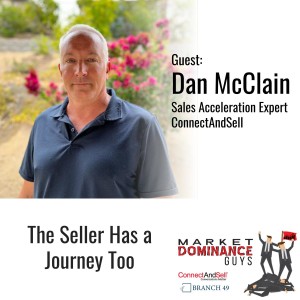
Tuesday May 17, 2022
EP132: The Seller Has a Journey Too
Tuesday May 17, 2022
Tuesday May 17, 2022
You’re no doubt familiar with the buyer’s journey, but what do you know about the seller’s journey? Dan McClain, Sales Director at ConnectAndSell and today’s guest on Market Dominance Guys, shares his personal journey as a salesperson with our host Chris Beall in this first of a two-part conversation. Starting at the beginning of his career, Dan tells the story of how he got into sales straight out of college, what his early selling experiences were like, and how he cold-called his way to where he is today. Most memorable for him was his first experience using ConnectAndSell Lightning, the cold-calling tool that boosts the number of conversations a salesperson can have with prospects. Pushing that “Go” button and being served one conversation after another changed his life and led to his current job selling Lightning at ConnectAndSell. Helping other salespeople discover this tool is now Dan’s mission. Listen in as Dan and Chris remember the details of their first meeting in today’s Market Dominance Guys’ episode, “The Seller Has a Journey Too.”
About Our Guest
Dan McClain is Sales Director at ConnectAndSell. His life-long dedication to sales has led him to his current goal: helping sales leaders, teams, and individuals connect with their targets at a velocity of 10X by using ConnectAndSell Lightning. Dan is based in the San Diego area and is active in his local chapter of AA-ISP.
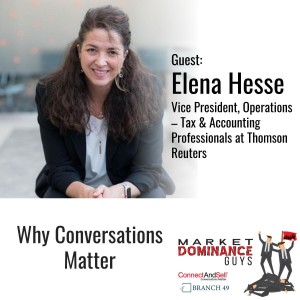
Tuesday May 10, 2022
EP131: Why Conversations Matter
Tuesday May 10, 2022
Tuesday May 10, 2022
“When you share your life nuggets, you don’t know when it’s going to matter to someone,” observes Elena Hesse, our Market Dominance Guys’ guest and the Vice President of Operations of Thomson Reuters’ tax and accounting professionals in this third of three podcast episodes with our hosts, Chris Beall and Corey Frank. For the past four years, Elena has led the “NoTimeToRead Book Club” for #GirlsClub, an organization dedicated to changing the face of sales leadership by empowering more women to earn roles in management. Corey starts off the conversation by asking Elena to describe what happens in a book club that doesn’t require reading the book. “A book is just a vehicle for a conversation. You never know when something is going to resonate,” she says, as she explains how the subject matter generates ideas and experiences that club members share with each other. And just like the book club participants, Corey, Chris, and Elena share ideas and personal insights of their own, which cover everything from the sales benefits of a live conversation over an emailed message to the trust-creating habit of asking for clarification when you don’t understand something. As Chris says, “The essence of curiosity is embracing our ignorance.” So, get ready to open your mind and heart to embrace what these three experienced salespeople share with each other — and with you — about the essence of this week’s Market Dominance Guys podcast, “Why Conversations Matter.”
About Our Guest
Elena T. Hesse, Vice President, Operations – Tax & Accounting Professionals at Thomson Reuters, has been with this firm for more than 30 years. Elena is also a thought leader for #GirlsClub, leading the book club discussions to support #GirlsClub and its continuing work of changing the face of sales leadership by empowering more women to earn roles in management.
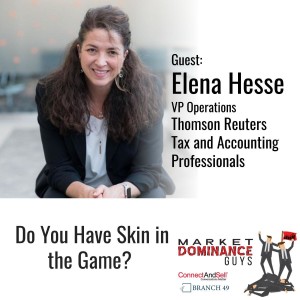
Tuesday May 03, 2022
EP:130 Do You Have Skin in the Game?
Tuesday May 03, 2022
Tuesday May 03, 2022
“When you go to a doctor, do you want that doctor to be excellent — or okay?” Elena Hesse, our Market Dominance Guys’ guest and the Vice President of Operations of Thomson Reuters’ tax and accounting professionals, poses this question to our podcast hosts, Corey Frank and Chris Beall. Their answer — and yours too, no doubt — is that they want doctors who love their job and do it extremely well. Elena, Chris, and Corey talk about how this equates to the role of the salesperson. In the old days, sales was generally a “hit and run” affair. You’d probably never see your customers again once the sale was made, so there was little reason to provide true value in a product or to develop and maintain a relationship with a customer. But in the modern world, most of us want to sell our customers an upgrade or an add-on or a renewal. So, product value and excellent customer relations are essential. In other words, if you want to be successful in sales today, our three sales experts say that it’s crucial to have skin in the game. Oh, yeh. It’s self-examination time. Evaluate your personal investment in your job as you listen to today’s Market Dominance Guys’ episode. “Do You Have Skin in the Game?”
About Our Guest
Elena T. Hesse, Vice President, Operations – Tax & Accounting Professionals at Thomson Reuters, has been with this firm for more than 13 years. Elena is also a thought leader for #GirlsClub, leading the book club discussions to support #GirlsClub and its continuing work of changing the face of sales leadership by empowering more women to earn roles in management.
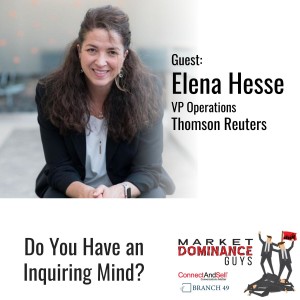
Wednesday Apr 27, 2022
EP129: Do You Have an Inquiring Mind?
Wednesday Apr 27, 2022
Wednesday Apr 27, 2022
“If you’re not curious, you’re not going to be a good sales rep.” That’s the well-considered opinion of our Market Dominance Guys’ guest, Elena Hesse, Vice President of Operations of Thomson Reuters’ tax and accounting professionals. As a naturally curious person herself, Elena has observed that “You can’t be speaking more than you’re listening” if you’re going to learn what you need to know about your prospects and their businesses. You have to ask those insight-seeking questions and then truly pay attention to their answers in order to discover whether your product or service is a good fit for their needs. Our two podcast hosts, Corey Frank and Chris Beall, totally agree with Elena that the best way to establish a good relationship with your sales prospect is with an inquiring mind — not a sales pitch. Curious about what else these three have to say? Listen to today’s Market Dominance Guys’ episode, “Do You Have an Inquiring Mind?”
About Our Guest
Elena T. Hesse, Vice President, Operations – Tax & Accounting Professionals at Thomson Reuters, has been with this firm for more than 13 years. Elena is also a thought leader for #GirlsClub, leading the book club discussions to support #GirlsClub and its continued work in changing the face of sales leadership by empowering more women to earn roles in management.
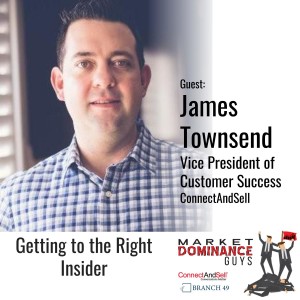
Wednesday Apr 20, 2022
EP128: Getting to the Right Insider
Wednesday Apr 20, 2022
Wednesday Apr 20, 2022
The triumphs, rewards, and prosperity of the customers he serves is at the heart of everything today’s Market Dominance Guys’ guest does. Meet James Townsend, Vice President of Customer Success and Growth at ConnectAndSell, as he discusses with our host, ConnectAndSell CEO Chris Beall, the different ways that sales has changed in the 10 years since James joined the company. They compare acquiring data on prospects, targeting the right insertion points (aka company insiders), the importance of cold call training, and selling vs. serving customers’ needs. You’ll want to stay tuned to the very end when they talk about what they see as “the next frontier,” on today’s Market Dominance Guys’ episode, “Getting to the Right Insider.”
About Our Guest
James Townsend is Vice President of Customer Success and Growth at ConnectAndSell, a company that pioneered the service of getting prospects on the phone for its customers’ cold callers to talk to. As one of his LinkedIn followers states, “James is a consummate professional with a deep desire to see his clients succeed.”
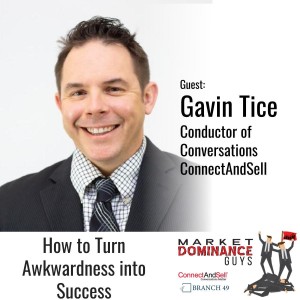
Monday Apr 11, 2022
EP127: How to Turn Awkwardness into Success
Monday Apr 11, 2022
Monday Apr 11, 2022
Does the thought of placing a cold call make you tense, nervous, embarrassed, or tongue-tied?
Today’s Market Dominance Guys’ guest, Gavin Tice, a sales instructor for ConnectAndSell’s Flight School, says not to worry about this awkwardness. He even says it’s an okay place to start. What a relief, huh? Our hosts, Corey Frank and Chris Beall, talk with Gavin today about how a standard operating procedure — in this case, a tried-and-true cold call script and method of delivery — can turn that frown upside down. What Gavin teaches is how to have a lot of fun and success making cold calls. Yes, you heard right: FUN! What a great reason to listen in while this Conductor of Conversations and our podcast hosts discuss the ways that SOPs, social work, psychology, and introversion positively impact the cold-calling experience in today’s Market Dominance Guy’s topic, “How to Turn Awkwardness into Success.”
About Our Guest
Gavin Tice is a Flight School instructor for ConnectAndSell. His background in the military and as a social worker have bestowed on him the perfect mix of skills needed to be a member of ConnectAndSell’s conversation optimization team, as he helps his Flight School students make success-building changes to their cold-calling delivery. A former team member of Gavin’s gives him this accolade: “Gavin’s depth of experience with sales and relationship building is like nothing I've encountered before. He brings his all to the table, every time.”
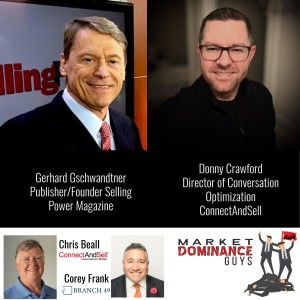
Tuesday Apr 05, 2022
EP126: Pattern Interrupts Are Your Friend
Tuesday Apr 05, 2022
Tuesday Apr 05, 2022
What’s a pattern interrupt? And how can it help you break down the resistance most people feel when ambushed by a cold call? Donny Crawford, Director of Conversation Optimization at ConnectAndSell, joins our Market Dominance Guy, ConnectAndSell CEO Chris Beall, on a Selling Power webinar hosted by Founder Gerhard Gschwandtner. These three conversation experts share some little-known tricks of the cold-calling trade, one of which is that saying something unexpected, like “Can I have 27 seconds to tell you why I called?”, can break a prospect’s usual pattern of hanging up or refusing to engage. As Donny says, it truly is a game-changer, especially when said in a friendly, playful voice. “The friendliness actually matters,” he explains. “You’ve got to be assertive enough, but in a friendly manner.” Get ready to absorb this and other helpful tips from ConnectAndSell’s Flight School cold-calling training lessons in this Market Dominance Guys’ episode, “Pattern Interrupts Are Your Friend.”
About Our Guest
Donny Crawford is Director of Conversation Optimization at ConnectAndSell. With the expertise developed as a former customer and as Customer Success Manager at ConnectAndSell, he operates as chief instructor of Flight School, a structured program designed to help cold callers find their voice. Hear more from Donny Crawford on his other Market Dominance Guys’ episodes.
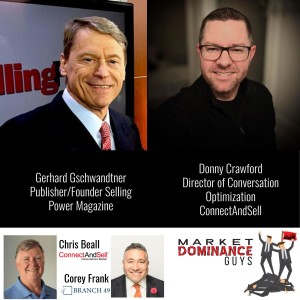
Wednesday Mar 23, 2022
EP125: Find Your Cold-Calling Voice
Wednesday Mar 23, 2022
Wednesday Mar 23, 2022
When you’re making a cold call, is the voice you’re using an effective voice? Or could it use a little fine-tuning so that you can engender trust with your prospect — the trust needed to secure a discovery meeting? Donny Crawford, Director of Conversation Optimization at ConnectAndSell, joins our Market Dominance Guy, ConnectAndSell CEO Chris Beall, to walk you through how to find your most effective cold-calling voice. In previous episodes of this podcast, you may have heard our guys talk about ConnectAndSell’s Flight School cold-call training program. In today’s episode, you’ll get a mini–Flight School lesson all your own, presented by master instructors, Donny and Chris. Not only will you get a tried-and-true script, but more importantly, you’ll hear detailed instructions on how to use your tone of voice to achieve cold-calling success. As Donny says, you’ll learn to bring out your “friendly voice,” and when you do, you’ll see how that voice can make some magic happen. All this — and so much more — in today’s Market Dominance Guys’ episode, “Finding Your Cold-Calling Voice.”
About Our Guest
Donny Crawford is Director of Conversation Optimization at ConnectAndSell. With the expertise developed as a former customer and as Customer Success Manager at ConnectAndSell, he operates as chief instructor of Flight School, a structured program designed to help cold callers find their voice. Learn more from Donny Crawford on these Market Dominance Guys’ episodes:
“Three Reasons Sales Reps Don’t Follow Up” https://marketdominanceguys.com/e/three-reasons-sales-reps-dont-follow-up/
“The Power of the Anti-Curse to Overcome Rejection” https://marketdominanceguys.com/e/the-power-of-the-anti-curse-to-overcome-rejection/
“Your Sales People Are Brain Surgeons” https://marketdominanceguys.com/e/your-sales-people-are-brain-surgeons/
“Never, Never, NEVER Retire a Follow-Up Call” https://marketdominanceguys.com/e/never-never-never-retire-a-follow-up-call/
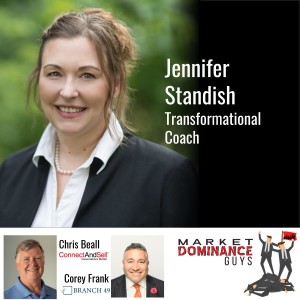
Tuesday Mar 15, 2022
EP124: The Magical Type of Cold Call
Tuesday Mar 15, 2022
Tuesday Mar 15, 2022
Are you motivated to help the prospects you’re cold-calling? Jennifer Standish, Founder of Prospecting Works, joins our Market Dominance Guys, Corey Frank and Chris Beall, in this third of a three-part conversation to talk about different approaches to this process we call “sales.” Thinking of a sale as a “win,” implies that sales is a contest between you and your prospect — and your prospect is the loser. Does this sound like cause for a happy dance? Jennifer says it makes her crazy to hear salespeople say that they’re “killing” their numbers. Corey and Chris agree that this aggressive attitude could also kill the chance of developing a trusting relationship with a buyer, a relationship that would serve both parties now and in the future. Oh, these three savvy sales folks know what’s what when it comes to making magic happen between a salesperson and a prospect. You’re going to want to take notes while you’re listening to this week’s Market Dominance Guys’ episode, “The Magical Type of Cold Call.”
Catch the previous two episodes in this conversation here:
EP122: Learning to Manage Your Voice Under Pressure
EP123: Hire Yourself a Grandma
About Our GuestJennifer Standish is Founder of Prospecting Works, an organization that assists salespeople in overcoming cold-call reluctance. She combines her 25-year cold-calling career with her skills as an intuitive healer, offering a “warm and fuzzy” approach that attracts introverts as well as people who don’t want to be considered salespeople.
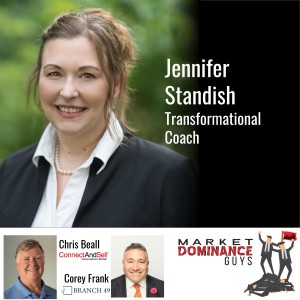
Tuesday Mar 08, 2022
EP123: Hire Yourself a Grandma
Tuesday Mar 08, 2022
Tuesday Mar 08, 2022
Would you hang up on your grandmother? Of course not! Jennifer Standish, Founder of Prospecting Works, joins our Market Dominance Guys, Corey Frank and Chris Beall, in this second of a three-part conversation to talk about the perfect voice for cold-calling success. Certain voices cause people to react in a positive way, and it turns out that a female over the age of 60 has the perfect voice to get that positive reaction needed to be a successful cold-caller. Who knew?! Well, researchers like Jennifer did. She has discovered that with a little training, middle-aged women without an identifiable accent are phenomenal appointment-setters. Corey and Chris enthusiastically agree with her that “grandmas are the untapped labor market we need in sales.” If this sounds bizarre to you, tune in to hear how the nuances of voice affect the trust you need to establish in the first critical moments of a cold call. It’s all on today’s Market Dominance Guys’ episode, “Hire Yourself a Grandma.”
Listen to the first part of this conversation:
EP122: Learning to Manage Your Voice Under Pressure
and the next segment after this one:
EP124: The Magical Type of Cold Call
About Our GuestJennifer Standish is Founder of Prospecting Works, an organization that assists salespeople in overcoming cold-call reluctance. She combines her 25-year cold-calling career with her skills as an intuitive healer, offering a “warm and fuzzy” approach that attracts introverts as well as people who don’t want to be considered salespeople.
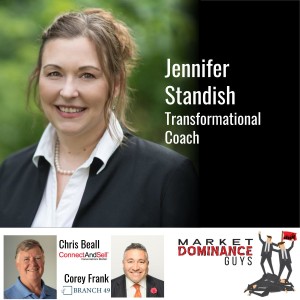
Wednesday Mar 02, 2022
EP122: Learning to Manage Your Voice Under Pressure
Wednesday Mar 02, 2022
Wednesday Mar 02, 2022
Jennifer Standish, Founder of Prospecting Works, is preaching to the Cold Calling Choir when she says that cold calling trainers don't spend enough time working with their people on their delivery. Jennifer and our Market Dominance Guys, Chris Beall and Corey Frank, all believe that a great script that hits all the points but has a terrible delivery won't get you any appointments. However, a great delivery — even if you're working with a mediocre script — will absolutely bring in the appointments. In this podcast, they also emphasize the importance of a salesperson's mindset when it comes to being a successful cold caller. If you think everybody's going to hang up on you, that everybody's going to be nasty to you, well, then, that is generally what you're going to get. But if you believe in your core that your product or service can truly help people, if you are certain of the integrity of your offering, then you can sell people on your belief. Why? Because your authenticity will come through to your prospects, loud and clear. Listen to this first of a three-part Market Dominance Guys' series by these three cold-calling gurus on today's episode, "Learning to Manage Your Voice Under Pressure."
Then, listen to the next two parts of this conversation here:
EP123: Hire Yourself a Grandma
EP124: The Magical Type of Cold Call
About Our GuestJennifer Standish is Founder of Prospecting Works, an organization that assists salespeople in overcoming cold-call reluctance. She combines her 25-year cold-calling career with her skills as an intuitive healer, offering a “warm and fuzzy” approach that attracts introverts as well as people who don’t want to be considered salespeople.
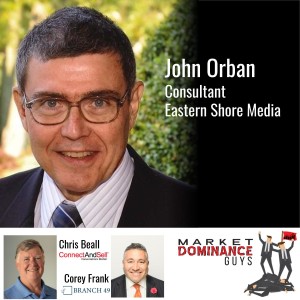
Tuesday Feb 22, 2022
EP121: Beware the Jabberwock, my son!
Tuesday Feb 22, 2022
Tuesday Feb 22, 2022
How do you de-risk your company? Marketing and business consultant John Orban and our Market Dominance Guys, Chris Beall and Corey Frank, wind up their four-part conversation by offering our listeners a great deal of advice about how to balance potential risk. These three sales scholars delve into the potential problems of forecasting your company’s success, the possible perils of determining the market value of your sales pipeline, and the pitfalls of the practice of inflating your sales and revenue prior to a reporting period, which is known as “stuffing the channel.” “I give myself good advice, but I seldom follow it,” admits Lewis Carroll’s famous character, Alice. In this vein, Chris warns that being in love with your brilliant idea for a business can make you into your great idea’s zombie — ignoring all you’ve learned about de-risking. Save yourself from that fate by listening to this week’s Market Dominance Guys’ episode, “Beware the Jabberwock, my son!”
The complete poem by Lewis Carroll is here.
About Our Guest
John Orban brings his background as a MetLife sales rep and as an administrator of computer networks to his current career as a marketing and business consultant for creative professionals.
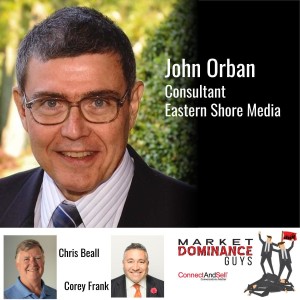
Tuesday Feb 08, 2022
EP120: Six impossible things before breakfast
Tuesday Feb 08, 2022
Tuesday Feb 08, 2022
Do you believe that the cold calls you make are an interruption in your prospect’s day? Well, they definitely are! But to what purpose? Marketing and business consultant John Orban and our Market Dominance Guys, Chris Beall and Corey Frank, use part three of a four-part conversation to take this inherent problem in sales and look at it from a different angle. Chris cites the podcast he did with ConnectAndSell’s Matt Forbes, whose epiphany about how belief in the opportunity he offers his prospects changed everything about the way he conducts cold calls. John cites the epiphany he experienced reading Betty Edwards’ book, Drawing on the Right Side of the Brain, when he discovered how a book can change your awareness of ordinary things and lead you to look at your world differently. Chris touts Geoffrey Moore’s book, Crossing the Chasm, for opening his eyes and engendering a new belief in empathy and how employing that essential quality can help you build trust with a prospect. And, with another of his insightful summations, Corey ties all these ideas together with the advice to “major in minor things.” Be prepared to garner insights of your own as our three dedicated students of sales and of life share with you their practice — just like Alice’s — of believing “Six impossible things before breakfast” on this episode of the Market Dominance Guys.
Drawing on the Right Side of the Brain - Betty Edwards
Crossing the Chasm - Geoffrey A. Moore
About Our Guest
John Orban brings his background as a MetLife sales rep and as an administrator of computer networks to his current career as a marketing and business consultant for creative professionals.

Wednesday Feb 02, 2022
EP119: Curiouser and Curiouser
Wednesday Feb 02, 2022
Wednesday Feb 02, 2022
Would you expect introverts to be good at cold calling? Oddly enough, they aren’t just good —they’re great! Today, we delve into why introverts make great salespeople in this second part of a four-part conversation between marketing and business consultant John Orban and our Market Dominance Guys, Chris Beall and Corey Frank. It turns out that introverts’ reluctance to push themselves forward makes them less likely to take over a cold-call conversation, and this allows prospects to talk. And when prospects talk — shazam! — we learn things about them that help us become partners on their sales journey. This insight sparked John to ask Chris the question, “What role do you think curiosity plays in the process of making a cold call?” Listen in to learn the whys and wherefores of this valuable cold-calling asset on this Market Dominance Guys’ episode, “ ‘Curiouser and Curiouser.’ ”
About Our Guest
John Orban brings his background as a MetLife sales rep and as an administrator of computer networks to his current career as a marketing and business consultant for creative professionals.
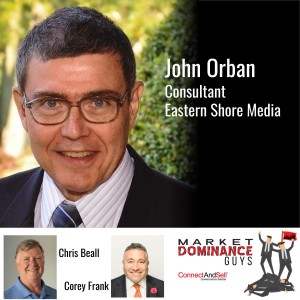
Tuesday Feb 01, 2022
EP118: Of Cabbages and Kings — and Blue Whales
Tuesday Feb 01, 2022
Tuesday Feb 01, 2022
“The time has come,” the Walrus said, “to talk of many things.” Our podcast guest, John Orban, is currently a marketing and business consultant who spent 24 years honing his sales skills as a rep for MetLife. Today, John joins our Market Dominance Guys, Chris Beall and Corey Frank, to talk of many sales- and life-related things. In this first episode of a four-part conversation, John, Chris, and Corey touch on the trickiness of successfully communicating an idea, on the importance of thinking but not over-thinking, on resisting the temptation to make things complex, and finally, on the math employed in sales and, thus, market domination. There’s even a bit about the stability of cruise ships. Seriously. Many things! And these three sales guys are just getting started, so don’t miss the fun in this Market Dominance Guys’ episode, “Of Cabbages and Kings — and Blue Whales.”
About Our Guest
John Orban brings his background as a MetLife sales rep and as an administrator of computer networks to his current career as a marketing and business consultant for creative professionals.
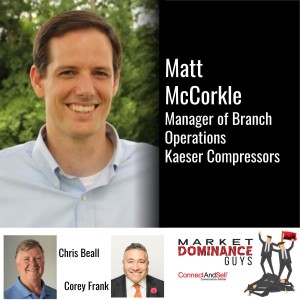
Tuesday Jan 18, 2022
EP117: We Try Hardest!
Tuesday Jan 18, 2022
Tuesday Jan 18, 2022
In striving for market dominance, which among the top companies in any field do you think puts forth the most effort to gain — or hold onto — that dominant position? Our guest, Matt McCorkle, Manager of Branch Operations for Kaeser Compressors, and our two Market Dominance Guys, Chris Beall and Corey Frank, debate this question during this final conversation of their four-part discussion on all things sales-related. Even loyal followers of our Market Dominance Guys’ podcast will be surprised at the shared opinion these three sales gurus hold about which highly ranked company within each industry or service can claim bragging rights to the title of this episode, “We Try Hardest!”
About Our Guest
Matt McCorkle is Manager of Branch Operations for Kaeser Compressors. He has earned both a bachelor’s degree and a master’s degree in mechanical engineering and has now been with Kaeser Compressors for 13 years.
Catch the three previous episodes in this session with Matt McCorkle:
EP107: On the Phone, They’ll Tell You the Truth
EP108: Sales and the State of Apprehension
EP109: Being There for Your Customers
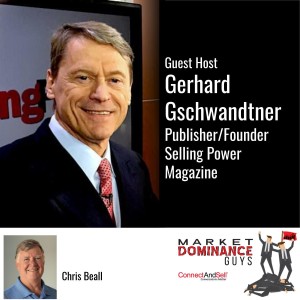
Tuesday Jan 11, 2022
EP116: Who’s Ready to Buy Right Now?
Tuesday Jan 11, 2022
Tuesday Jan 11, 2022
When your prospect’s response to your cold call is “Not now,” do you assume they mean they’re too busy to talk at that moment? Or perhaps this is just their way of getting rid of you altogether. Our Market Dominance Guy, Chris Beall, talks with Gerhard Gschwandtner, CEO and founder of Selling Power, in this podcast about a more probable reason you’re hearing “Not now.” It has to do with the replacement cycle and consideration cycle of businesses. In other words, where they are in the three-year buying cycle most businesses utilize for timing when they begin considering a new product or service — or replacing an existing one. Once you determine if “Not now” really means “We’re not ready to purchase at this time,” what you do next is critical! Listen in as Chris and Gerhard divulge the intelligent way to deal with the 11/12ths of the market who aren’t ready to buy at this time. Take my word for it: You won’t want to miss the market-dominating advice you’ll hear on this Market Dominance Guys’ episode, “Who’s Ready to Buy Right Now?”
About Our Guest HostGerhard Gschwandtner is founder and CEO of Selling Power magazine, as well as CEO of the Sales 3.0 Conference series. Gerhard’s career has always been centered around helping sales leaders create peak performance in business and in life through video interviews, online events, and live workshops and retreats.

Tuesday Jan 04, 2022
EP115: The Enemy of Your Message Is Drift
Tuesday Jan 04, 2022
Tuesday Jan 04, 2022
The only reliable way to see if your company’s value statement resonates with your prospects is to have lots of conversations with them, and for that, of course, you need salespeople. But as our Market Dominance Guy, Chris Beall, tells our guest host, Gerhard Gschwandtner, founder and CEO of Selling Power magazine, that’s not all you need. You first require an expert to craft the scripted message salespeople will use in their cold calls. And you need a coach to train your callers to deliver that message in the most effective way. Once cold-calling begins, you then need a coach to make sure your salespeople don’t drift from your carefully crafted script and specified way of delivering it. “Under pressure,” Chris says, “we all begin to drift, to try something a little different, something unproven. So, somebody’s got to keep the salespeople together, and that’s the coach.” Join Gerhard and Chris as they provide coaching on the importance of sales-call coaching in this week’s Market Dominance Guys’ episode, “The Enemy of Your Message Is Drift.”
About Our Guest Host
Gerhard Gschwandtner is founder and CEO of Selling Power magazine, as well as CEO of the Sales 3.0 Conference series. Gerhard’s career has always been centered around helping sales leaders create peak performance in business and in life through video interviews, online events, and live workshops and retreats.
Full episode transcript below:
Chris Beall (01:20):
You're going to start with one. Right. This is really simple. So you make a list of some possibilities and then you start putting companies in those lists and then you choose the one that's kind of right-sized. Hey, we think we're going to sell for average sales price of $37,000. That's our guess. And we're going to have a gross margin of 73%. That's our guests because we've looked at our cost of goods and all that. And so if we get about this many looking at our overhead, we will be profitable. That's cool. Or maybe we'll be financable, which is a speculation about future profits.
Chris Beall (01:57):
So we need a market about this big. So let's not make one any smaller than that. And then we're going to make some lists. This is why having the reps make the list doesn't make sense. This process would not work with a bunch of sales reps. This is executive management with the marketing function and the product function, getting together and you make the list. And you go, here's one, here's one, here's one. You could close your eyes and pick one at random, but don't pick two or three and don't address two or three at a time. We address two now, ourselves at ConnectAndSell. We've been in business 15 years.
Gerhard Gschwandtner (02:29):
Wow.
Chris Beall (02:29):
We've been selling successfully in the marketplace for 15 years. We're up to two. I'm thinking of adding a third. I'm almost there, but guess what? My salespeople are not adding the third. We're going to add the third over here in executive mysteries. This is board of directors level stuff. And like, are we going to do this? Because it represents risk and it represents an investment. So how do you choose the ones you're not going to pay attention to? It's all the ones that aren't the one you are paying attention to. One is an easy number. It's a lonely number. It's according to a song,
Gerhard Gschwandtner (03:04):
Right.
Chris Beall (03:04):
Lonely. But you have to be as old as us to even have heard that song Gerhard. So that's what an addressable market is. So I've already addressed this, but I'm going to address it again. Business leaders and sales leaders need to be business leaders. You must dominate at least one market because somebody will. That is whatever you're doing fits in one market, two markets, three markets, whatever, somebody is going to be the dominant player. That's called just math. Right. If you run a race, somebody's going to win the race. I don't need to know who it is to know that it's somebody. There's a little piece of calculus if you remember Gerhard, that they taught us that, right?
Gerhard Gschwandtner (03:42):
Right.
Chris Beall (03:42):
So it's a little fact about curves and this has to do with this maximum and minimum thing. So if you don't dominate at least one market, you have two problems. One is a survival problem because whoever dominates that market is going to choose whether you survive or not. They're going to keep you around kind of as their servant. Oh yeah. You take those, we'll take these, the good ones. You can have the leftovers. Right. So you're the dog under the table, hoping for scraps. That's not the greatest position to be in, especially if somebody can put the dog out or put the dog down, which is not so great. Right.
Chris Beall (04:19):
So the other reason is that it drives valuation. And whether you're a private company or public company or whatever, valuation is an expression of the willingness of others to invest in your future. That's exactly what it is. So you'll get 10 times the valuation for being a dominant player than for being the number two player. So you only have to dominate one 10th as many markets, like one and you get evaluation. That's according to the dominant player, and according to the other factors of your business. Like what are your gross margins, blah, blah, blah, blah, blah. Now I realize in the venture capital-dominated world, this is a funny thing. They don't like this so much. What they want you to do is to spend their money relatively quickly and show that you might have some currency across a whole bunch of potential markets.
Chris Beall (05:16):
And they rely on roughly speaking, only two or 3% of you surviving and the rest turn into salvage operations. So if you want to play that game, you can go play that game. It's still really smart early in that game before you take the venture capitalist money to know that you can dominate one market. So what you do is you just make the list and you go talk to them and you don't even build the product. You just talk to them and you get the resonance and you know the meetings are moving forward. Then go get the money from the VCs and then you won't be conflicted because now you can sell and make them happy, sell and grow.
Chris Beall (05:51):
And meanwhile, you can also be dominating, which is your, that's your safety factor, because guess who you have to deal with at that point? You have to deal with the VCs. And if you dominate one market, if they don't want to fund you in the future, you just tune your overhead down and you're profitable and enjoy life. And then go find another market to dominate. So instead of being in that two or 3% that succeed, you will be in the 100% that succeed. Dominating at least one market assures success. It's very hard to go out of business as the dominant player in one market. It just is.
Gerhard Gschwandtner (06:26):
It's a very, very powerful lesson . And there's something I think a psychological inhibitor that especially in S&B where business owners don't think that way. They think more in terms of survival or meeting immediate needs. But I think that the domination strategy that you're espousing makes a lot more sense.
Chris Beall (06:55):
Well it does. And by the way, it goes along well with survival and meeting immediate needs in a funny way. But it does mean you have to have the discipline to not do deals with folks that are not in your market. Or to reevaluate a very specific question, which is, did we just miss them? We should have put them in the list and we didn't. But I tell you confirmation bias will make you invite unwanted guests into your market and they will distract you. The disease that kills companies is distraction. That's why little companies shouldn't do quote-unquote strategic partnerships with other little companies. They give each other the disease called distraction and it's highly communicable. So be careful of it. You need focus. And the focus is, starts with the list. It's really easy to stay focused when you have that list.
Gerhard Gschwandtner (07:45):
Yeah.
Chris Beall (07:45):
You can go through the list and say, have we talked to everybody on this list? We haven't. Let's take the ones we haven't talked with and try to talk to them. Okay. If somebody wants help doing that, come to me. I can help you talk to a whole bunch of people. That's what we do, is like to folks. Right. And we help you talk to people. Have we got a meeting with everybody on the list? Not yet. Well, we have a job to get a meeting with the rest. Have we learned from the meetings that we've had? What resonates? So what percentage are resonating on the economics, what on the emotional, and what on the strategic, and what didn't resonate at all? That's a little trickier, but it's very objective step, by step, by step.
Chris Beall (08:26):
And by going step by step, we do take care of immediate needs. Because guess what? We'll actually be closing business sooner than not. And the best part is it keeps getting easier instead of getting harder. That's the reason you do this. Now here's a funny thing about markets and it's really awkward. One is you need different people to go on a market dominance program than are normally hired. And we already saw the answer in the poll. You need either externally or internally, somebody to do dispassionate research and make that list. And they cannot be distracted by oh, their comp plan for instance, right? I mean, it's like, can you imagine CEO of the company goes well, I made the list like this. It turns out it took us right off a cliff, but it helped me make an extra $50,000 last year. Like no, you get fired for that as a CEO. Well, this as a person has to have the CEO hat on, so to speak and they've got to be tied to future market dominance. So you need to hire either internally or externally somebody to do research.
Chris Beall (10:19):
Research. You also need to either hire or put in place processes that cause you to have a structured identical message that asks the question, do you care about the economics? Do you care about the motions or do you care about the strategy piece of what we offer or nothing? And you need to have people who are expert at delivering that. That means you got to hire somebody to help you put together a message that reliably, I call it taps the bells. So think of it like this. You have an assembly line going by you and your job is to determine which of these things that look like bells are actually bells. I was just in Italy and they have beautiful bells there and they're made out of whatever they're made out of metal, right, brass, bronze. I don't know how they make bells.
Chris Beall (11:06):
So they have these beautiful bells. But what if the bells could be made of clay? And they just go thud and they look identical. They weigh the same and they're going by you. And your job is to figure out which ones are bells that we can ship to our customers and which ones are duds that we have to just send back to be crushed up into clay again. Well, you tap them. Boom or thud. Right. That's what we do with conversations.
Chris Beall (11:35):
The only reliable way to determine that somebody is resonating like a bell with our message is one, to have a message. So we need to hire somebody who is really good at putting together a message that works psychologically for people so that they will resonate or not with one of these three elements. It's simple. It doesn't take very long to do. But now we need to hire another person and could be the same person, a coach to make sure that everybody's staying precisely on that message because the big problem with focus is the enemy of focus is drift. So distraction leads us to be scattered, but drift and Gerhard you and I know this well, right? We're both golfers. And we both know what happens to our golf swings.
Gerhard Gschwandtner (12:22):
Right.
Chris Beall (12:23):
When we quote-unquote, find something, right, on the range or whatever, or we have a lesson or whatever it is and we kind of got it, what happens? Under pressure of playing on the actual golf course, whether competitively or not, we begin to drift. We're tempted to try something a little different, right? We're tempted. And it's why golf is this funny game, right? It tempts you inside your mind to try something unproven because that last one didn't work so well, I'll try this. So drift is the enemy of the precision you need to have your message delivered the same every time, which it takes to know if you're resonating.
Chris Beall (13:06):
That is if sometimes I'm tapping the bell and sometimes I'm just waving a stick around, and sometimes I pick up a little hammer into it, and sometimes I do it with my finger, I'm not learning about bells. I'm learning about hammers and fingers. I'm learning about my reps. So somebody's got to keep the reps together and exploring the market systematically with a message. And that's a coach. Coaching needs to be done in real-time. Just like a golf swing. You can't bring me your golf swing from last week. Describe it to me and I'll coach you. I got to watch you while you're doing it and go, Gerhard, remember when it was really, really great because you actually had your right hand a little bit more on top of the club so your wrist could hinge rather than the thing you're doing right now with the thumb behind it that ain't going to work. Right.
Chris Beall (13:53):
In real-time, we could do that. At the end of the week, you're describing it to me. That's how we tend to coach sales reps. We get them together on a one-on-one at the end of the week and then we tell them war stories or we ask them how it's going or whatever. Right. This is performance. This is performance. And we've got to have a coach who coaches to performance in real-time. And then of course, we need to hire people who can have the conversations. By the way, they can be junior people, they can be senior people as long as they sincerely believe in the potential value of the meeting that they're selling, but they got to sell the meeting. The meeting is the first concrete step into the market that tells you whether that resonance is happening.
Chris Beall (14:33):
How do you know the bell rings? They take the meeting. Not they said a nice thing. Oh, I'm interested. Send me some information, blah, blah, blah. No, no, no. They take a meeting. So you've got to be trying to sell the meeting, but what's valuable in the meeting, learn it. So your reps have got to know what's valuable in the meeting, right? So you have to hire the right kind of people. You have to train them up to sell the meeting. You got to coach them in real-time and they need to avoid drift. Otherwise, you don't know what's going on in your market. That's a bunch of very practical things to do. And then your list is made by a research team or by marketing, if they're doing it honestly. And the driver for that is the company strategy.
Gerhard Gschwandtner (15:12):
I think you did a lot of thinking on your vacation about this because we have done a number of webinars together. And this is an experience today where you come up with a lot of clarity and a lot of good insights that are fundamental to running a business that's focused on market dominance. The enemy of focus is drift. We got to share it on Twitter. We got to share it on LinkedIn because so many salespeople drift away from their process, from their script, from their story, and they improvise like you and I do on a golf course.
Chris Beall (15:53):
Exactly, exactly. And they do it because it's uncomfortable doing the other thing. And by the way, you need to build what is conventionally considered sales pipeline in order to know that you're dominating the market. You got to actually be engaging with folks. That first engagement is probably going to be an ambush conversation. And the reason is simple. You can't figure out that resonance with the economics, or the emotions, or the strategy by sending somebody an email. The clever email that gets somebody to take a meeting, for instance probably is not a gate other than this is a person who takes meetings. That's not what you're looking for. You're actually, you have to do it the other way around. Define the role and the company and then talk to them. But the first time you talk to them, they're probably not going to be as ready for you to talk to them. You got to ambush them. It's kind of sad actually, but you got to do it.
Chris Beall (16:52):
And so to build that pipeline, we have to have first conversations. And first conversations with strangers are extremely uncomfortable. In fact, they're right at the edge of choosing to be exiled from the village. If you want to kind of go in the hierarchy of bad things that humans really don't like, here's what they don't like. One, they don't like invisible strangers. They don't like them. Because in the environment of evolution, I'm reading The Decameron right now, by the way, Boccaccio's Decameron. Right. So even just back there in Florence, in the 1300s, just then not that long ago, it was dark at night. There were no electric lights. Probably a quarter of the stories that those 100 stories involve an invisible stranger. Invisible strangers are scary, scary things. They're not here to bring us a Bud Light.
Chris Beall (17:46):
They're the bad people from across the river. We're really civilized in the village that we live in. We paint our faces vertically. Those horrible people, they paint them horizontally. That's terrible. Everybody knows that's bad, except them apparently. And they speak a little differently and they eat food that smells not quite like ours. And when they show up at night, that's why they're invisible. And they're not here to bring us a Bud Light. They're here to change the demographics of our village to look more like their village because we won't be here anymore. So we don't like invisible strangers. And we don't like exile. We don't like being kicked out of the village. So here we are getting those emotions about being an invisible stranger and maybe being rejected by somebody, exiled. And we package it all together and call it a cold call.
Chris Beall (18:38):
And it's awkward and it's tough. It's not as tough as people think. You can learn how to do it. And you have to have the right mindset and you teach mindset, been teaching mindset for years, how important it is. And you have to have the right technique. And I'll compare this to surfing. It's like being a surfer. It's very artistic. It's very beautiful. And you're probably not going to shape your own surfboard because you don't know-how. When you're learning to surf, you surf on somebody else's, on a board that was made for surfing, not on your eye idea of a surfboard. The script you're going to use is just like the surfboard. It's shaped by an expert so that you can bring your emotions out and be human. You don't have to invent the words and wonder whether the words are right, wrong, or indifferent.
Chris Beall (19:24):
You don't have to worry whether you're using colloquialisms or too many syllables or whatever and got the pace wrong or whatever. You can actually work with a script just like working with a surfboard that was designed by an expert based on years and years and years of experience and experimentation. And then you can get comfortable there and express yourself like the surfer using their body, using their balance, using their cerebellum, all that stuff they use in order to make that beautiful move on the wave. They didn't invent the board. Right. So your speaking voice is the surfer. That's where your artistry is. That's where your humanity comes out. I'll just give you a little piece of computer science here. It's actually information science. As you know, that's one of my backgrounds, right? I'm a,
Gerhard Gschwandtner (20:10):
Right.
Chris Beall (20:11):
Written millions of lines of code and all that kind of horrible stuff. And I'm a physicist and mathematician by background. I look at this like this. How much information is going back and forth as we're building our pipeline? Because it takes a lot of information to get somebody to trust you enough to listen to you, enough to get to the point where they might resonate with your message. Well, if I send you an email, I've got about 5,000 bits of information in there, if you read it. That's just information theory. A character of information is about 10 bits and I can add them up. I might get to 5,000 bits. When I'm speaking with you, that's 20,000 bits a second. So an email corresponds to one-quarter of one second of human speech. And yet there's not all the words of the email in that one-quarter of a second.
Chris Beall (20:59):
So what's in there? Is it just waste? Probably not. Right. Evolution kind of carries that stuff away. It's the emotional content coming from the tone of voice. It's who am I and can you trust me? That's what's coming in my voice and that's actually all of the 20,000 bits except the words. So the job of the words is to carry the voice. It's the job of the voice to create trust. It's the purpose of trust to allow us to get curiosity. It's the job of curiosity to get somebody to commit to doing something they don't want to do, which is to spend more of their time with us or with our expert. And then it's the job of that expert of the expertise to actually explore the possibility of working together to solve a problem.
Chris Beall (21:47):
So we've got a handle in our sales pipeline that first little bit. How long do we have to do it? According to Chris Boss of the FBI, used to be with the FBI, he told me the answer to this question one night, seven seconds. We have seven seconds to get somebody to trust us. So our sales pipeline really is this. Of that list we made, how many of those folks in that list now have some trust with somebody on our team because that person had a conversation with them and executed the first seven seconds correctly. That's the beginning of your pipeline. The rest of the pipeline flows naturally from the mathematics of the situation. Put more in, you will get more out. When somebody tells me there's a quality, quantity disparity, well, yeah, I have very high-quality conversations. I just don't have very many of them. It's like that's nonsense, because that's saying your psychic. You know in advance everybody who's going to buy.